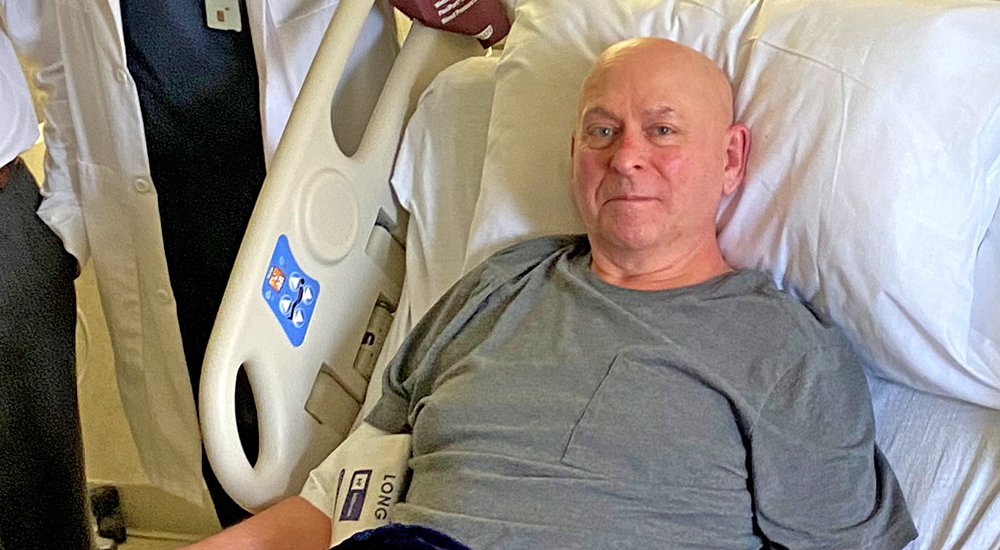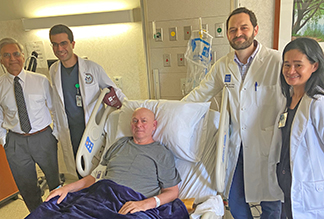A Marine Corps Veteran got an infusion of hope this week when he became the second patient in Texas—and the first Veteran in the country—to receive a groundbreaking drug aimed at slowing the progression of amyotrophic lateral sclerosis (ALS).
The new ALS medication, Qalsody, was approved by the FDA in April of this year. Roy Swearingen, 65, from Cypress, Texas, received the medication at Michael E. DeBakey VA in Houston and feels optimistic about the drug’s benefits.
“I am hoping for the best, and I’m grateful to be able to get this new medication. My VA doctors told me about the research into this drug and when it became FDA-approved, they were right on top of getting me started on it as soon as possible. I can’t thank them enough,” Swearingen said.
Qalsody is used for the treatment of a rare form of ALS in adults who have a mutation in the superoxide dismutase 1 (SOD1) gene. “About 1 to 2 percent of ALS patients have the SOD1 gene, making them eligible for this new medication. This is the first approved treatment to target a genetic cause of ALS and we are thrilled to offer it to Mr. Swearingen and other eligible Veterans,” said Dr. James Orengo, director of the Houston VA ALS Center.
“We have a three year old son who wants to know his father.”
Swearingen was diagnosed with ALS a little over a year ago and, according to his wife, Sally, the availability of a new medication means the world to his entire family. “We are very hopeful that we will see an improvement or at least a slowing of the ALS symptoms as a result of the new medication. We have a three year old son who wants to know his father,” Sally said.
ALS, also known as Lou Gehrig’s disease, is a neurological disease that causes degeneration of nerve cells in the brain and spinal cord, leading to muscle weakness, atrophy and loss of function. ALS ultimately robs a person of the ability to walk, talk, eat and breath. The ALS Association says over 5,000 people are diagnosed with the disease every year and most people who develop ALS are between the ages of 40 to 70. Early diagnosis of ALS is very important, especially when it comes to Veterans.
“Although there currently is no cure, early detection and expert clinical care can provide optimal quality of life through a total body and wholistic management of symptoms,” Orengo said. “Research tells us that Veterans are at greater risk of being diagnosed with ALS than those with no history of military service. At VA, we are determined to make sure our Veterans have access to the latest available medications and treatments of ALS symptoms.”
Houston VA offers Veterans with ALS a state-of-the-art multi-disciplinary team approach to their care in a specialized ALS Center. “The Houston VA ALS team is thrilled to be able to offer Qalsody as an option for ALS Veterans. This is an exceptional example of personalized medicine that showcases the VA’s agility in offering cutting edge therapy to Veterans in a timely manner,” said Dr. Pitchaiah Mandava, chief of neurology.
For Sally Swearingen, her husband’s ALS diagnosis is one of the biggest challenges of her life. Born and raised in Iraq, Sally has lived through three wars and is determined to support her husband in the fight against the health and life challenges ALS presents.
“Getting an ALS diagnosis has been devastating, but in my gut I know the right thing to do is to try and fight it with the latest medications and the best medical care. This new medication and VA is offering us hope, and that’s what keeps us going,” she said.
Topics in this story
More Stories
At 79, Douglas B. Hatch was paralyzed by Guillain-Barré syndrome. Now 83, he’s training to compete in the National Veterans Wheelchair Games.
VA delivers the care you have earned—whenever and wherever you need it.
Face it, muscle tension is not good for your health, but you can do something about it in 15 minutes!







I agree ALS is a terrible disease. I’ve had it for 14 years. I lost the ability to use my hands and arms first. I have slowly lost ability to walk and hold my head up (a condition called drop head). I can stand with assistance briefly. Now I am losing my voice and ability to eat. I recieve most meals now a days throw a feeding tube. So yes I understand this disease.
However we continue to pour money into foreign nations rather then financing and aggressively going after a cure for this disease. which will probably cause the VA a hundred million a year in benefits. Plus the pain and suffering of the individuals with ALS. I truely believe we are going about this the wrong way. There are too many studies that are begging for money out there.
I will get off my soap box now.
Thank you,
James Weber
Hey my fellow veteran friend. I’m an Air Force vet from the Vietnam Era 1968-1972. I didn’t serve there but you did! The Marines have always been MY HEROES! And I’m proud of all you guys. You’ll beat this just like other battles you’ve fought and won. God speed buddy!
Does Vets cover the cost of Eliquis prescription for a past Vet.
Im glad to see progress being made. After going through this disease and ultimately the loss of my wife, I can truly say anything that can extend the life of someone with ALS is a winner in my book. I wish the best for Roy and his family.
Hang in there Buddy, we’re praying for you !
Marine Corps Vet (Vietnam)
My father and his older brother, my uncle both died from ALS. I am so happy to see drugs that can slow the progression of ALS.
So happy to see this happening! I hope and pray that this is the beginning to an ultimate solution for the challenges that are brought to the person as well as those who are their caregivers and families being impacted by such a horrible disease.
God Bless!!!